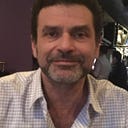Great essay. I hope my many highlights speak volumes. I could have highlighted much more but I didn't want to color every screen. I'm pleased to see this has been well read. I'll be sharing it with a few of my Medium friends. Now what more can I say, as my M.O. is often to add thoughts, including relevant pieces of my own.
I loved For Whom the Bell Tolls. I think I pulled it out of a box in the attic a few weeks ago, thinking I would enjoy a re-read. I'm sure I would and I would like to. Still, I have so many books that I have purchased and not yet read. I did read Hermann Hesse's Narcissus and Goldmund for the 4th time this past summer, the first time being way back in high school (I'm 56 now). He's my favorite author and this is my favorite book of his (I touched on it here--https://thetaoist.online/hermann-hesse-alan-arkin-and-marcus-meet-in-a-bar-to-discuss-philosophy-with-marcus-7582ce0bad14). When you spoke of the transitory nature of death, my thoughts went to my friend who knows she is dying--advanced cancer for a couple years now. I don't think death seems transitory to her even though we both believe in reincarnation over more cycles than most can even imagine. Recently she's been writing a lot of poetry about death and dying, epitomizing the concept of ars moriendi, the art of dying well, that I first learned of several months ago when I read Hesse's first novel, Peter Camenzind. I wrote that aspect of the book here. https://medium.com/write-under-the-moon/learning-to-love-by-observing-the-art-of-dying-well-2048b13f71d2 I linked to a couple of my friend's poems in there.
Suicide is a topic that I write about from time to time, with the goal of suicide attempt prevention. I always say attempt prevention because I think our dates of death are the one aspect of every soul contract, which I prefer to call improv scripts, because I believe in free will and thus how we live and how we die are very much influenced by free will, both our own and others. In my suicide attempt prevention articles I weave my spiritual (NOT RELIGIOUS) beliefs with Viktor Frankl's work on the subject as discussed in his Man's Search for Meaning, a book that profoundly impacted me. This essay of mine is my most read and engaged with piece despite its 17-minute estimated read time. https://medium.com/illumination/dizain-of-suicide-72bcde4dc8d8 Those that should read it, do. People hear me and I have done some good.
One of my purchased and unread books is How Not to Kill Yourself, written by a philosopher and surviver of many attempts. I heard him interviewed on NPR early this year, and the times I find myself listening to a radio interview in my life I could count on one hand if I even remembered them, so I took it as synchronicity that I needed to buy and read and write about the book. Yet, it still sits. What grabbed me was when he said it's better to tell patients its ok that they think about suicide. That way they don't feel ashamed about thinking about it, which guilt and shame and thinking something is wrong with them can hasten an attempt. Better to tell them, "ok, think about it, but you don't have to do it today. You can always do it another day." That relieves pressure.
Ok, this comment is long enough and I'm running out of daylight to get in a 5-8 mile walk. Glad I encountered you today.
PS: I love hummingbirds. Check out my tattoo: https://photos.app.goo.gl/8r9TC5UwEpPBQcZ49
